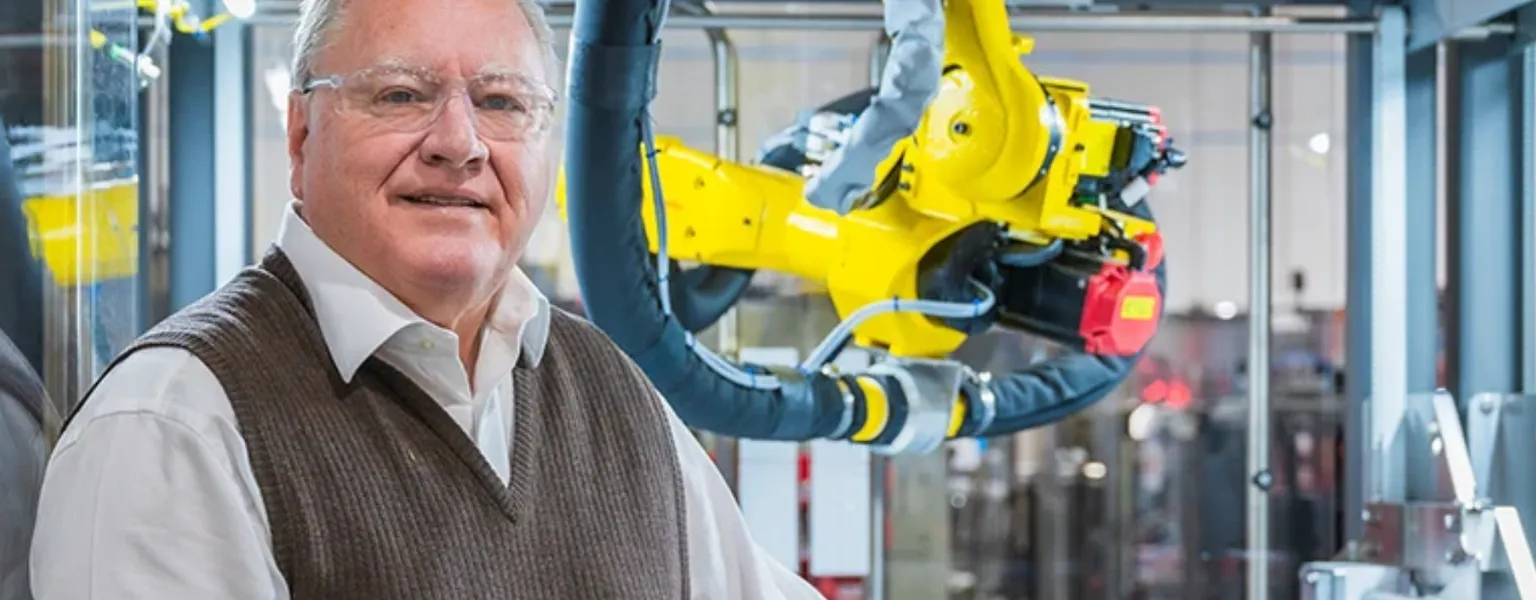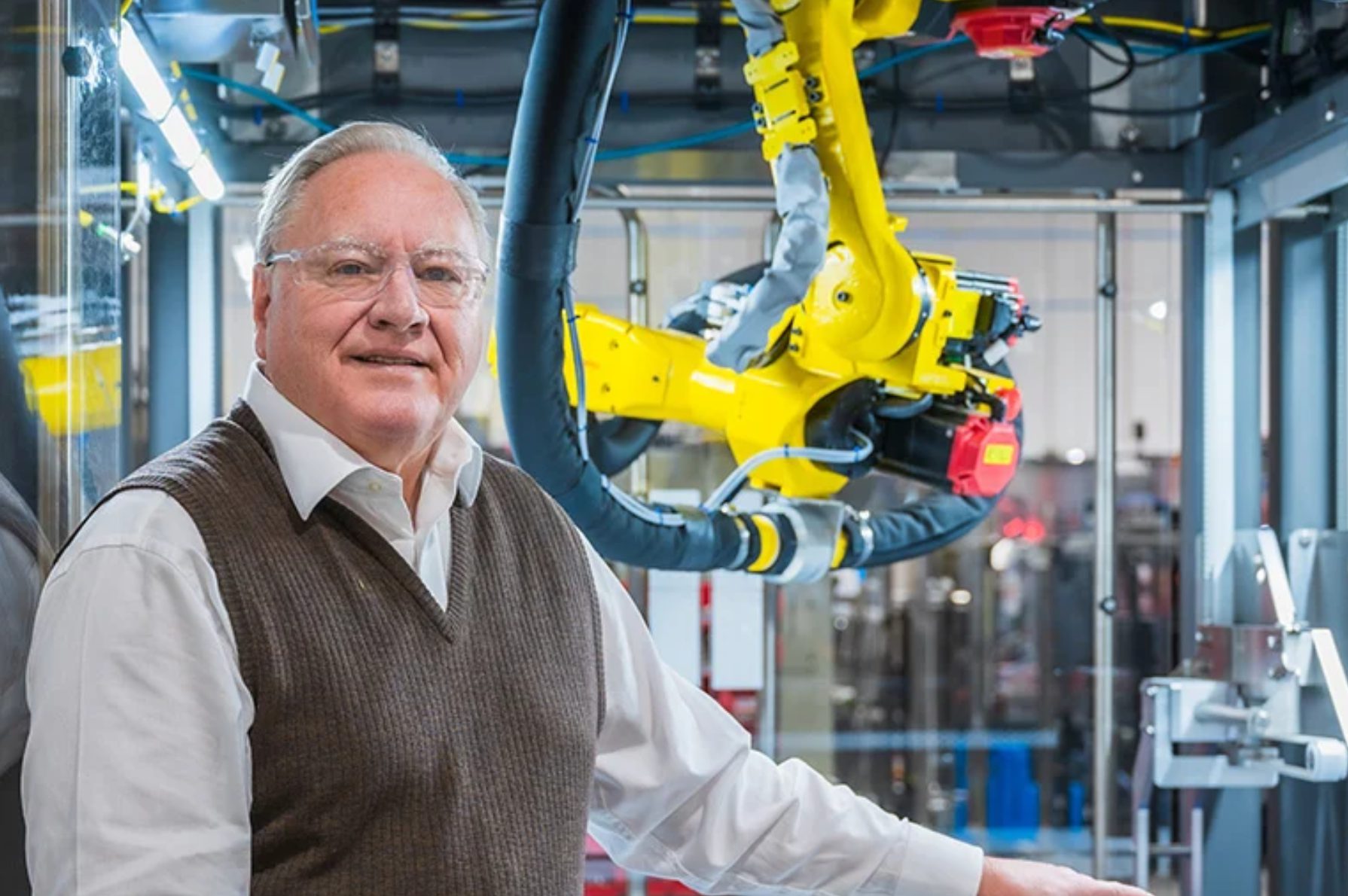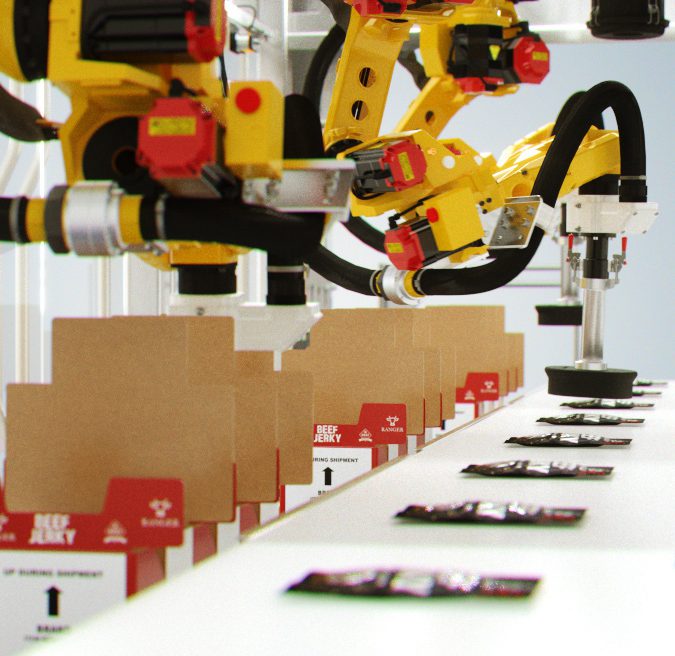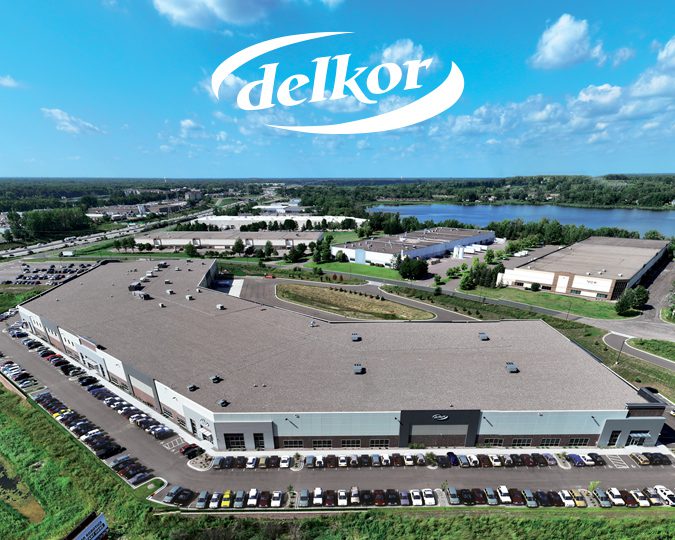Delkor's inventive mindset strengthens lead in retail-ready market

Supplier News
The ability to think outside the box can be an exceptionally powerful competence and competitive advantage in the packaging machinery business—especially when it results in a much better box.
Founded in 1973, family-owned end-of-line packaging equipment manufacturer, Delkor Systems, has enjoyed a remarkable period of brisk growth and expansion in recent years by leveraging its expertise in robotics and automation technologies to not only provide world-class robotic corrugated case and paperboard carton packaging lines, palletizing and other related packaging equipment for its CPG industry customers, but also set new retail industry benchmarks for shelf-ready packaging excellence and sustainability.
Nowadays employing about 350 people at a state-of-the-art, 315,000- square-foot manufacturing complex located nearby the main bridge connecting Minneapolis with its Twin City of St. Paul, the company’s relentless rise to industry prominence began in earnest in 1999 when its former sales manager, Dale Andersen, purchased the company from its original founder, Jim Duddleston, himself a notable packaging pioneer credited with inventing one of the first machines for packaging liquid milk in paperboard cartons.
A graduate of the University of Minnesota with a B.S. in Food Science and Technology, along with an MBA from the Carlson School of Management, Andersen’s thorough knowledge of the company and its key customers—acquired in his 12 previous years as a Delkor employee—were an exceptionally useful asset in transitioning the company from a standard “brown box” cartoning machine-builder into an innovation-driven, high-tech manufacturing powerhouse focused on providing complete automated packaging solutions for clients demanding maximum shelf impact for their brands.

“The one key thing I learned during those early years was just how important packaging design is to a successful machinery solution,” Andersen told the Canadian Packaging magazine in a recent interview.
“Making package design an integral part of the entire circle of responsibility is what makes Delkor different from much of our competition,” says Andersen, citing the company’s on-site Package Lab packaging design center equipped with state-of-the-art package prototyping and testing equipment.
“We’re one of the few OEMs, maybe the only OEM making case packers and carton equipment that has a dedicated packaging lab and packaging engineers on staff,” says Andersen, adding the company employs 50 full-time engineers across its operations.
“It’s a value-added service that we provide free of charge to our customers,” he says, “because we believe it’s critical for us to be able to work with the customer on the package design." Says Andersen: “We are very focused on innovation and are willing to spend the money to have the right team in place to provide valuable innovation in terms of packaging designs, machinery designs, and the way they come together on the packaging lines.
“We can do a design turnaround in 24 hours,” he relates, “and we often have customers come here to see us test the designs, validate them, and see how they work on the machine. We know what designs work best with our equipment,” says Andersen, “and being able to test them on our machines internally is an amazingly powerful capability. So instead of taking months going back and forth with corrugated companies testing different designs to suit the application, we can quickly provide our customers with innovative solutions that streamline the customer’s usage of packaging materials and making their packaging process more efficient."
“We also understand what the mass merchandisers are looking for,” says Andersen, citing relentless pressures by leading mass merchandisers and Club Store operators across North America to make their vendors supply more of their products in efficient and attractive retail-ready packaging and shelf displays requiring minimal in-store handling.
As Andersen relates, the company’s knack and affinity for retail-ready packaging were first unleashed about eight years ago when its Vice President of Engineering, Rick Gessler, came up with an innovative new shelf-ready box design, called Cabrio Case®, initially intended to facilitate upright shelf packaging for bags and stand-up pouches of cheese products.
Made from a single corrugated blank for optimal material usage and die-cutting precision, the patented tray-hood retail-ready package quickly attracted interest from retail giant Walmart as an alternative to displaying the bags of cheese by hanging them on steel racks by the pre-applied hang-holes just
above the upper seal.
Easy to open on the shelf with a single swift motion with no cutting required, the Cabrio Case—easily produced alongside other traditional cases on Delkor’s Trayfecta line of case formers (shown right)—features a perfectly-pre-cut tray front to provide perfect presentation for the product inside the case, standing up or laid-down flat, with its wrapped tray corners and machine-cut front edges and sides facilitating a clean and tidy look for the entire shelf.
Moreover, the one-piece corrugated construction used to make Cabrio Cases helps to reduce the corrugated usage by up 30% compared to conventional two-piece box designs, according to Delkor, which Andersen says was also a major factor in Walmart’s quick embrace of the innovative new box design.
As Andersen recalls, the Cabrio Case was originally developed for leading U.S. dairy producer Schreiber Foods, who asked Gessler to join its marketing team for a presentation at Walmart’s global headquarters in Bentonville, Ark., just as the retailing giant was deciding what its first generation of retail-ready packaging was going to look like.
According to Andersen, the presentation went so well that Walmart soon began redesigning the cheese aisles of its stores soon after to accommodate what was at first simply called “Rick’s box” before being granted a patent.
“Today, approximately 65% of all cheese sold at Walmart in the U.S. is packaged in Cabrio cases,” states Andersen, crediting the design’s flexibility, material savings and ease of handing for enticing packaged foods manufacturers across many other product categories for adopting the Cabrio Case for their retail-ready packaging solutions.
As Andersen points out, Cabrio Case packaging allows users to save an average of 20% per box in material costs compare to other retail-ready designs while helping them improve their packaging sustainability profile.
“It provides a tremendous reduction in the use of corrugated,” he extols, “and you can only imagine what it means in terms of sustainability.”

Notably, the use of the Cabrio Case design is offered to customers for free with the purchase of a Delkor case packer, says Andersen, as one of the many value-added features used to market the company’s high-end equipment.
According to Andersen, the introduction of the Cabrio Case and other innovative packaging to the market will hasten the end of the CPG industry’s long-standing reliance on using the standard RSC (regular slotted case) boxes for their secondary packaging needs.
“The RSC box was originally invented by corrugated companies about 60 to 70 years ago as a pop-open box designed specifically for manual hand-loading of packaged products into a brown box—it was never intended for automation,” he states. “The RSC box doesn’t really fit into the plan for a highly efficient and sustainable solution for corrugated packaging,” says Andersen, adding that automating secondary packaging lines simply to run RSC boxes faster dilutes the efficiency and productivity benefits that automation is expected to deliver.
“When we first developed the Cabrio case, we saw there was a lot of so-called retail-ready packaging out there that were really just RSC cases with tearaway perforations,” he recalls, “and it just looked terrible on the shelf with the bits of torn corrugated debris messing up the shelves, terrible graphics and generally poor product presentation. Also, using robots to top-load RSC cases present a lot of problems because there is a lot of dimensional variance between the RSC cases themselves, just because of the way they are made,” Andersen adds. “Because it is not a precision process, you may have up to a quarter-inch variation from box to box, which really doesn’t work well with robots.”
In contrast, the robotic loading of precision-cut Cabrio Cases on Delkor case packing equipment results in highly repeatable, high-efficiency, high-speed loading process with exact product placement and great shelf impact at the point of sale, Andersen contends.
“I predict that five years from now there will be very few large and medium-sized companies using RSC boxes,” he proclaims. “You will probably see some small companies using it simply because they may not yet have the money for automation,” he allows, “but we are seeing a huge trend in the market towards widespread replacement of the RSC box.”
As Andersen explains, the widespread use of robotic technologies across all of Delkor’s machinery product lines has also enabled the company’s engineers to significantly reduce the changeover times on Delkor machinery—making it a highly attractive capital investment proposition for busy high-volume packaging lines across a fast-growing swath of CPG industries.
For companies serving multiple Club Store and other large retailers, the quick changeover capability is a priceless asset, Andersen asserts. “There are probably close to 20 different designs of Clubs Store retail-ready packaging used by Walmart, Costco, Sam’s Club and other mass merchandisers,” Andersen explains, “and being able to switch from one to another within minutes, without any human intervention, is a big part of the efficiency equation.
“We spent about three to four years developing a new approach to how you design a packaging line,” he relates, “which resulted in the launch of new patented case forming technology that enables producers to switch from one shipper [box] style to another in under three minutes,” he states.
“That's three minutes for the case former and eight minutes for the entire line,” he enthuses. “There is no other machine in the world I’m aware of that has this capability. “That innovation alone has enabled Delkor to more than double its sales over the last three years,” Andersen reveals, “because it solves a very important problem.
“It allows a producer to be able to ship whatever the mass merchandiser wants efficiently—without having an adverse impact on production or having to have two lines instead of one.”
Andersen adds the company is eagerly looking forward to displaying its latest patented case-packing technology at the upcoming Bakery Showcase 2024 trade show and conference in Toronto, May 5-6, 2024, signaling the company’s growing interest in the promising Canadian market.
Says Andersen: “We will be running our Trayfecta G corrugated case former (shown left) and our Model 350 corrugated case closer and demonstrate the ability to change over to any shipper style—including brown boxes, retail-ready formats, and the full range of Club Store trays—in just three minutes.”
As Andersen relates, Delkor Systems has already completed 10 different packaging line installations for Cabrio Case packaging at some of Canada’s largest CPG manufacturers—including the country’s leading confectionery and cheese producers—and the overwhelmingly positive feedback from those Canadian customers to date has been exceptionally encouraging.
The continuous improvement and refinement of leading-edge technologies is firmly embedded in the company’s culture, according to Andersen, because it enables Delkor to respond faster to the ever-growing packaging changes upgrades that major retailers demand from their vendors.
“All mass merchandisers compete with each other via their packaging,” he says, “so accommodating any changes to that packaging in timely manner is critical.
“Whatever the market wants today, it will be different next year,” Andersen declares. “For us, that means having a flexible machinery design that can handle all the different shapes, sizes and product diversity of whatever the customer needs.
“I am very proud to say that about 80% of the machines we sell today did not even exist six years ago,” says Andersen, citing several recent new machinery innovations that include a new high-speed case-packer for glass bottles, capable of packing 380 bottles per minute, and a case-packer for small confectionary pouches, offering throughput speeds of up to 360 pouches per minute.

Nowadays manufacturing about 300 machines per year, Delkor’s key product lines include:
- The Trayfecta series automatic case-forming machinery;
- Several brands of automated and robotized case-packing equipment, including LSP, MSP and V series machines;
- Various carton and case closing machines for tri-seal and flange seal cases, cartons, stackable club store trays and retail-ready packages;
- Robotic palletizers incorporating FANUC brand palletizing robots.
As Andersen estimates, “About 60% of all the machines we make are intended for processing flexible packaging, with the reminder for rigid packaging formats.
“Our machines can work with glass bottles, flexible plastic pouches and bags, large-sized industrial bag weighing up to 10 kilograms … pretty much the whole gamut of product shapes and sizes,” says Andersen, adding all Delkor equipment installations are looked after by the company’s highly skilled field service technicians.
“Our field service department reports directly to me,” Andersen states. “These people are given a very high profile because they interact with our customers every day. “Every machinery solution we supply to the market has our total technical support because that is the best way to establish ourselves as a real partner to our customers,” he concludes. “And our customers really appreciate that partnership as a critical factor for the efficient operation of their packaging line for many years to come after the initial installation.”
This article was originally published in Canadian Packaging.
Related News
-
Supplier News
Delkor automation brings big benefits to employees and bottom line
-
Supplier News
Delkor introduces Rapid Delivery Program for carton formers & closers
-
Supplier News
Delkor unveils revolutionary case packer technology at PACK EXPO 2024
-
Supplier News
Delkor: Maximizing efficiency – how case packers can help combat rising costs
-
Supplier News
Delkor leads cheese packaging with unmatched, versatile solutions





